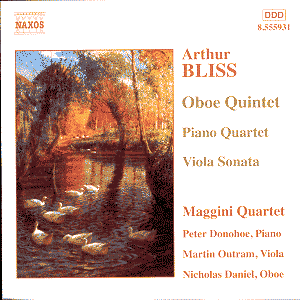The more that I am fortunate enough to contribute
to these pages, the longer my list of worthy unsung composers
becomes. This exemplary disc of chamber music by the British composer
Sir Arthur Bliss has caused me to add yet another member to my
roster of musical causes to champion. Bliss is a composer who
to these ears strikes the perfect balance between sheer aural
pleasure and intellectual challenge to the listener. Indeed, his
is a fresh and original voice, akin to such sadly under performed
masters as William Alwyn, George Enescu and Kurt Atterberg. One
can hope that splendid performances like this one will carry further
the banner for off the beaten path music.
Born of the generation of composers who came
of age between the two world wars, Bliss knew sadness at an early
age when his mother died prematurely. He would serve in the Great
War, and the loss of his brother in that horrible conflict was
to have a profound effect upon the young composer. One can almost
hear a sort of catharsis in the works played here, especially
in the fiendishly difficult and emotionally charged viola sonata
of 1933.
Leading off the program is the sometimes lyrical
and sometimes boisterous Piano Quartet. Often inspired by the
work of great performing artists, the quartet was dedicated to
the pianist Lily Henkel and her ensemble. This is a work whose
two substantial outer movements are contrasted nicely by the brief
and delightful Mazurka that connects the more passionate outer
sections. Members of the Maggini quartet, whose playing I have
heretofore praised highly in these virtual pages, acquit themselves
splendidly in this lovely and tuneful work. Peter Donohoe, a formidable
player in his own right, tends to be a bit too thunderous in forte
passages, but on the whole helps to propel the music forward at
a brisk and exciting pace.
Although it is hard to single out one piece on
this fine program as being above the others, the medals must go
to violist Martin Outram and pianist Julian Rolton for their simply
breathtaking performance of the sonata. This is a tour de force
of virtuosity, with some incredibly challenging passagework in
the extreme upper registers of the instrument. Central to the
work is the monumental second movement, which begins quietly with
plucked strings over soft piano chords and unfolds into an essay
of Dickensian proportions, requiring intense concentration and
organization of thought on the part of the player. Up next is
the monstrously difficult Furiant and if that is not enough,
we are immediately lunged into a coda, no less difficult than
the previous virtuoso showcase. Much more harmonically advanced
than the earlier quartet, this is a work that at times challenges
the listener. One simply has to concentrate hard in order not
to miss any of the wonderful complexities set out on display,
and repeated listening continues to reveal new wonders. Our duo
plays with both abandon and control and gives us a marvelous performance.
The atmospheric Oboe Quintet is another complete
winner, ranking amongst some of the most picturesque and evocative
music to strike these ears in some time. The playing here is without
fault, and the sense of nostalgia evoked by the hauntingly lofty
melodies and eerily ambiguous tonal centers makes this a most
endearing composition indeed. Most appealing was the frequent
sense that time had stopped and that we were left only to relish
the sheer beauty of the moment.
Once again, Naxos have proven that your name
does not have to be Mozart to have produced some fine music. Their
willingness to take risks continues to pay off, and one can only
hope that more touring ensembles will be brave enough to program
music such as this. This leads me to my chastisement of audiences
to cease their lamentable habit of staying home when these sorts
of programs turn up in their local concert halls. GO! Listen!
And avail yourselves the opportunity to experience something not
only new but sublime.
Sound production, especially in the latter two
works is beyond reproach and Keith Anderson has contributed yet
another enticing essay. This is not to be missed, and I for one
cannot wait to experience the other items in the Naxos catalog
by this very worthy composer.
Kevin Sutton
